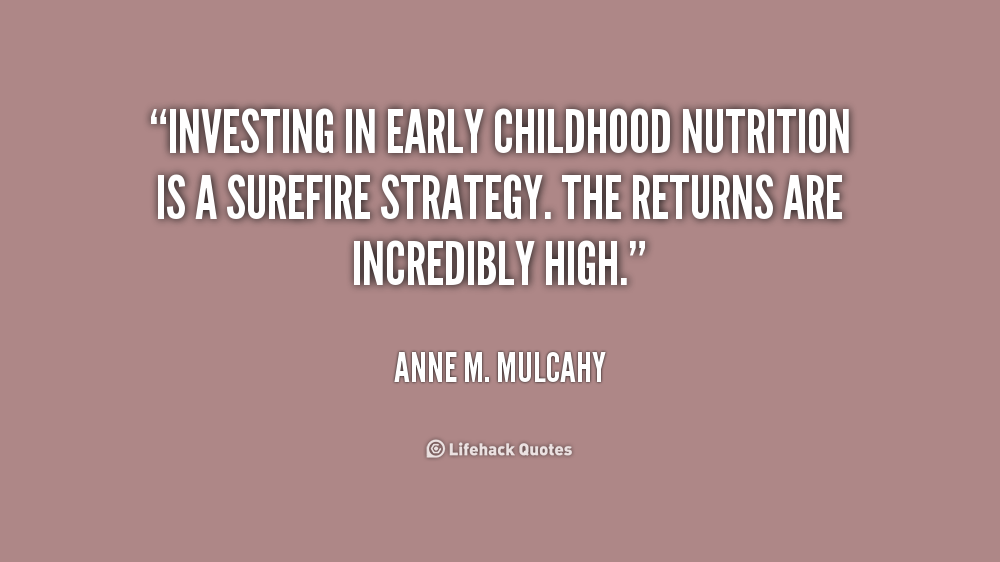Investing In Early Childhood Development: A Long-Term Strategy For Mental Health

Table of Contents
The Neuroscience of Early Brain Development and Mental Health
The foundation for lifelong mental health is laid during the critical years of early childhood. Understanding the neuroscience of early brain development is key to understanding why investing in this period is so vital.
The Sensitive Period Hypothesis
The sensitive period hypothesis emphasizes the crucial role of early experiences in shaping brain architecture. During this period, the brain is highly plastic, meaning it's extremely responsive to environmental input. Nurturing and stimulating environments foster healthy brain development, promoting strong emotional regulation, robust social skills, and sharp cognitive abilities. Conversely, adverse experiences can have a profoundly negative impact.
- Nurturing environments: A loving, responsive caregiver provides the building blocks for secure attachment, reducing the risk of anxiety, depression, and other mental health challenges. This includes consistent care, emotional responsiveness, and opportunities for positive social interaction.
- Adverse Childhood Experiences (ACEs): Experiences like neglect, abuse, trauma, or household dysfunction can disrupt brain development, increasing the vulnerability to mental health problems such as PTSD, substance abuse, and chronic mental illnesses later in life. The impact of ACEs can be significant and long-lasting.
- Secure Attachment: A secure attachment relationship with a primary caregiver provides a sense of safety and security, allowing the child to explore the world confidently and develop healthy coping mechanisms. This secure base fosters resilience and helps buffer against the negative effects of stress.
The Economic Benefits of Early Childhood Investment
While the human cost of neglecting early childhood development is immense, there's also a strong economic case for investment. The long-term benefits far outweigh the initial costs.
Reduced Healthcare Costs
Investing in early childhood development translates to long-term savings in healthcare expenditures. By preventing mental health issues through early intervention and support, we can significantly reduce the burden on healthcare systems. Early identification and treatment of mental health concerns are far more cost-effective than managing chronic conditions later in life.
Increased Workforce Productivity
Children who receive high-quality early childhood education and care are more likely to succeed academically, leading to higher earning potential and increased workforce productivity in adulthood. This translates to a stronger economy and reduced reliance on social welfare programs.
- Cost-effectiveness of early intervention: Numerous studies demonstrate the significant return on investment associated with early intervention programs, showcasing that prevention is far more cost-effective than treatment.
- Positive return on investment: Investing in early childhood development reduces crime rates, improves societal well-being, and leads to a more productive and engaged citizenry.
- Successful programs: Programs like Head Start in the US and similar initiatives globally have demonstrated the positive economic impact of early childhood investments.
Effective Strategies for Investing in Early Childhood Development
Several key strategies can help us maximize the impact of investing in early childhood development.
High-Quality Early Childhood Education
Access to affordable, high-quality early childhood education and care, including preschool and childcare programs, is paramount. These programs provide children with a stimulating learning environment and crucial social interaction, setting them on a path to success.
Parental Support and Education
Parental involvement and access to resources for parents are vital. Supporting parents through parenting education, resources, and support networks empowers them to create nurturing and stimulating environments for their children.
Community-Based Initiatives
Community-based initiatives that provide support services for families and children, such as home visiting programs and parent support groups, play a crucial role in fostering healthy child development.
- Effective interventions: Research-based interventions like home visitation programs and parent-child interaction therapy have proven highly effective in promoting positive child development.
- Policy changes: Implementing policies that expand access to affordable, high-quality early childhood care and education, support parental leave, and provide financial assistance to low-income families can significantly improve outcomes.
- Individual actions: Individuals can support early childhood development by volunteering at local programs, advocating for policy changes, and donating to organizations working in this field.
Conclusion
Investing in early childhood development is not merely a moral imperative; it's a smart, strategic investment in a healthier and more prosperous future. By prioritizing early interventions, we can prevent mental health challenges, improve economic outcomes, and build a stronger, more resilient society. The evidence is clear: investing in children's futures is an investment in our collective future. Learn more about how you can contribute to improving early childhood development in your community today! Explore local early childhood intervention programs and support organizations dedicated to fostering healthy child development. Let's work together to ensure every child has the opportunity to thrive.

Featured Posts
-
 Israil Meclisi Esir Yakinlari Ile Guevenlik Guecleri Arasindaki Catisma
May 02, 2025
Israil Meclisi Esir Yakinlari Ile Guevenlik Guecleri Arasindaki Catisma
May 02, 2025 -
 Kort Geding Kampen Vs Enexis Gevecht Om Stroomnetaansluiting
May 02, 2025
Kort Geding Kampen Vs Enexis Gevecht Om Stroomnetaansluiting
May 02, 2025 -
 Perfectly Cooked Crab Stuffed Shrimp A Lobster Sauce Recipe
May 02, 2025
Perfectly Cooked Crab Stuffed Shrimp A Lobster Sauce Recipe
May 02, 2025 -
 Waarom Geeft Nrc Gratis Toegang Tot The New York Times
May 02, 2025
Waarom Geeft Nrc Gratis Toegang Tot The New York Times
May 02, 2025 -
 Improved Fortnite Item Shop Finding Items Just Got Easier
May 02, 2025
Improved Fortnite Item Shop Finding Items Just Got Easier
May 02, 2025
Latest Posts
-
 Official Announcement Grant Assistance For Mauritius
May 03, 2025
Official Announcement Grant Assistance For Mauritius
May 03, 2025 -
 Lakazet 157 Gola I Presledvane Na Vrkha Vv Frantsiya
May 03, 2025
Lakazet 157 Gola I Presledvane Na Vrkha Vv Frantsiya
May 03, 2025 -
 Rekord Za Lakazet Lion Se Bori Za Vtoroto Myasto V Liga 1
May 03, 2025
Rekord Za Lakazet Lion Se Bori Za Vtoroto Myasto V Liga 1
May 03, 2025 -
 157 Gola Lakazet Pishe Istoriya Vv Frenskiya Futbol
May 03, 2025
157 Gola Lakazet Pishe Istoriya Vv Frenskiya Futbol
May 03, 2025 -
 Signing And Exchange Of Notes Grant Assistance To Mauritius
May 03, 2025
Signing And Exchange Of Notes Grant Assistance To Mauritius
May 03, 2025
